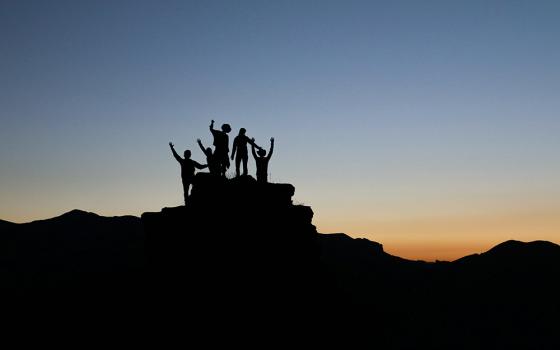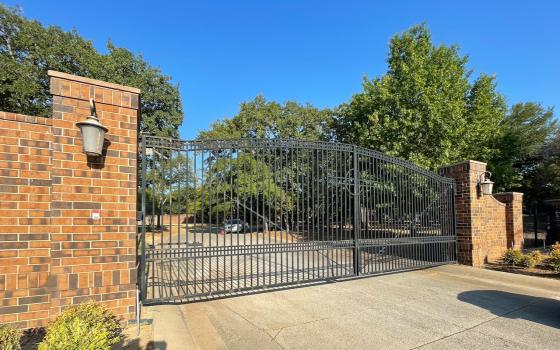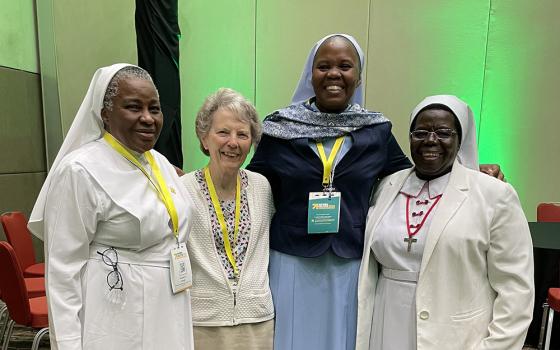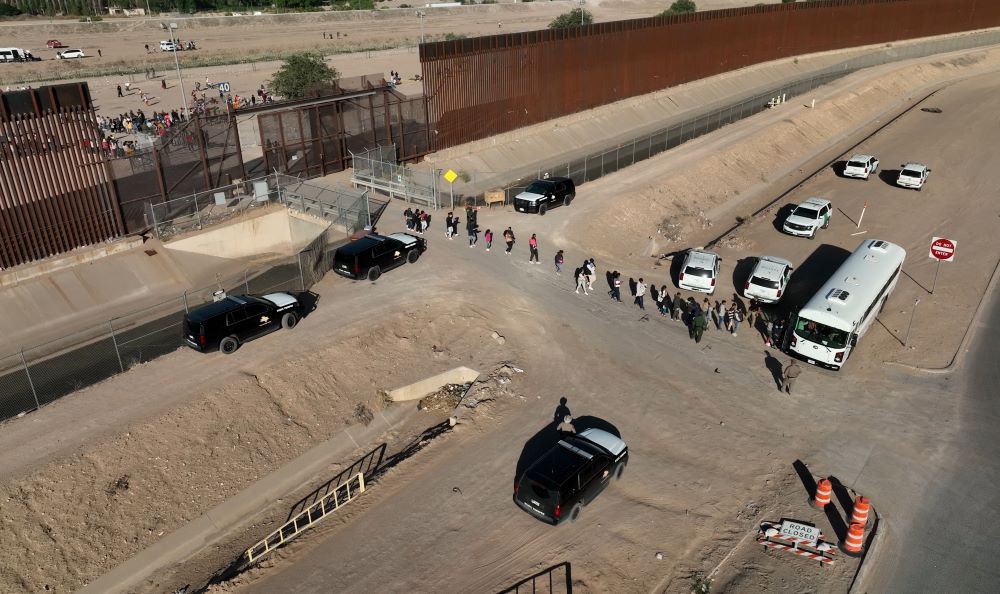
Migrants line up to board a U.S. Customs and Border Protection bus after crossing the U.S.-Mexico border before the lifting of Title 42 near El Paso, Texas, May 11. (OSV News/Reuters/Julio Cesar Chavez)
Editor's note: Global Sisters Report's Monday Starter is a feature from GSR staff writers that rounds up news from or about women religious that you may otherwise have missed.

The International Union of Superiors General and the Scalabrini International Migration Institute are offering a course in September in Rome for women religious who want to learn more about migrants, refugees and asylum seekers.
The course, Sept 18-21 at the headquarters of the Dicastery for Promoting Integral Human Development, is limited to 45 participants, but also will be available to 300 online participants. It will be based on this year's theme for the Sept. 24 World Day of Migrants and Refugees: "Free to Choose Whether to Migrate or Stay."
The course is for women religious who want to learn more about immigration issues or want to be trained to serve migrants, refugees, asylum seekers, internally displaced persons, victims of trafficking, itinerants and their families, the dicastery says in materials about the course.
"The training sessions will introduce the phenomenology of the migratory phenomenon, the international legal framework of human rights and will focus on the responses that the Church can provide," the dicastery says.
In Latin America, organization calls on religious life to join mining divestment
The Confederation of Latin American Religious has joined a mining divestment campaign promoted by the Churches and Mining Network, an ecumenical group that promotes socio-environmental rights.
"We are experiencing unbridled (mining) extractivism, which destroys, kills and corrupts. That's why CLAR — the Confederation of Latin American Religious — invites #ReligiousLife in #LatinAmerica and the #Caribbean to participate in the Mining Divestment Campaign," the organization wrote in a July 20 Facebook post in Spanish.
CLAR has spoken against extractive industries, participated and carried out programs of its own against mining, particularly as it pertains to effects on the environment and the poor, including in many communities where sisters in Latin America serve.
Advertisement
New film about St. Teresa of Kolkata
Fall brings a new film about St. Teresa of Kolkata titled "Teresa & Me."
In publicity material, Fathom Events, which is organizing the film's October rollout in the U.S., says it references part of the saint's "dark night" as well as her early work in India.
The film is juxtaposed with a fictional account of a British woman who finds herself pregnant after her boyfriend leaves. That event sends her on a trip to Kolkata, her family's ancestral homeland and the place where St. Teresa, canonized in 2016, carried out her mission with the poor.
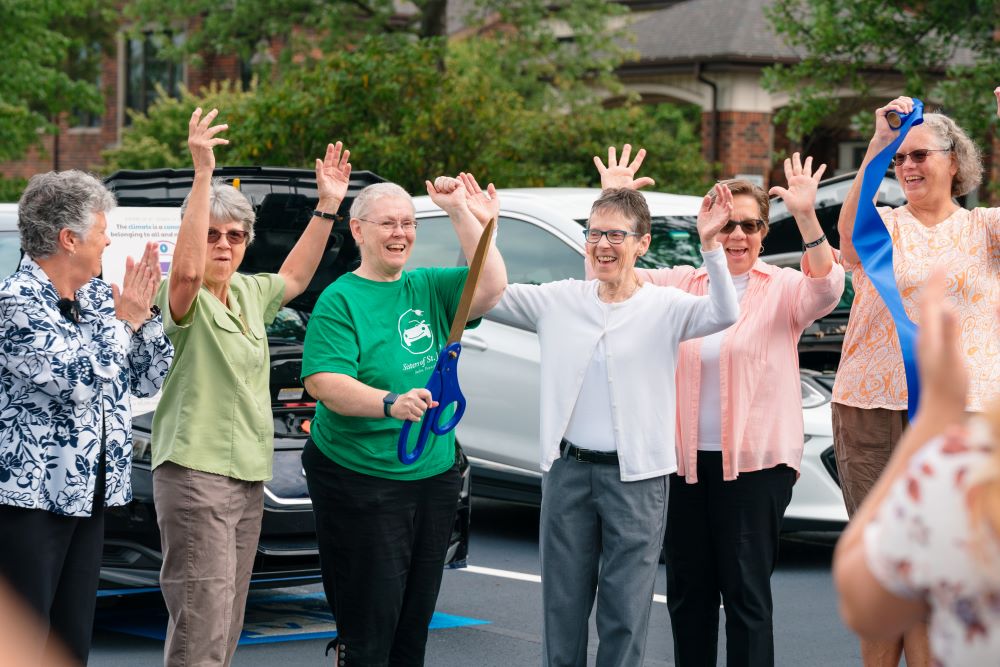
The Sisters of St. Joseph of Baden, Pennsylvania, celebrated the opening of two public electric vehicle charging stations on their campus. While drivers are charging up their cars, they can walk the 80-acre motherhouse grounds. (Courtesy of Sisters of St. Joseph of Baden, Pennsylvania)
Pennsylvania sisters celebrate opening of EV charging stations
The Sisters of St. Joseph of Baden, Pennsylvania, celebrated the opening of two public electric vehicle charging stations on their campus with dancing.
Yes, dancing.
And the dance — if you haven't already guessed it — was the Electric Slide.
The charging stations are only the fourth to open in Beaver County; Baden is on the Ohio River just northwest of Pittsburgh. As part of the celebration, charging was free during the grand opening — on average, it costs between 30 and 60 cents per kilowatt hour to use a public charging station, or roughly $12 to $23 to fully charge a small car, but the sisters only charge 20 cents per kilowatt hour, which is the average cost of charging an electric car at home. Even better, while drivers are charging up their cars, they are free to walk the motherhouse grounds, whose 80-acres are one of the largest privately held green spaces in the county and home to a greenhouse, a garden for the sisters plus two community gardens, egg-laying hens, an apiary, nature trail and pollinator and rain gardens. That's a much better view than any gas station or parking lot can offer.
"We're excited to contribute to building a nationwide infrastructure that will lessen our dependence on energy sources that pollute our environment, disrupt the climate, and endanger the health of the planet and all of us living on it," said Sr. Kari Pohl, the congregational coordinator for justice and peace, in a press release about the installation. "Our faith calls us to care for creation in both individual and collective ways so that all life may flourish, today and for generations to come."
Sr. Mary Parks drives the sisters' first fully electric vehicle to work and ministry sites and serves on the congregation's leadership team.
"Our whole purpose in life as religious women is to be what God wants us to be and help the world to be what God wants it to be. It's not just about having consciousness about what's happening (to our environment), it's about having a conscience," she said in the press release. "We cannot leave this world the way it's going for our children."


